高考复习情态动词[上学期]
图片预览
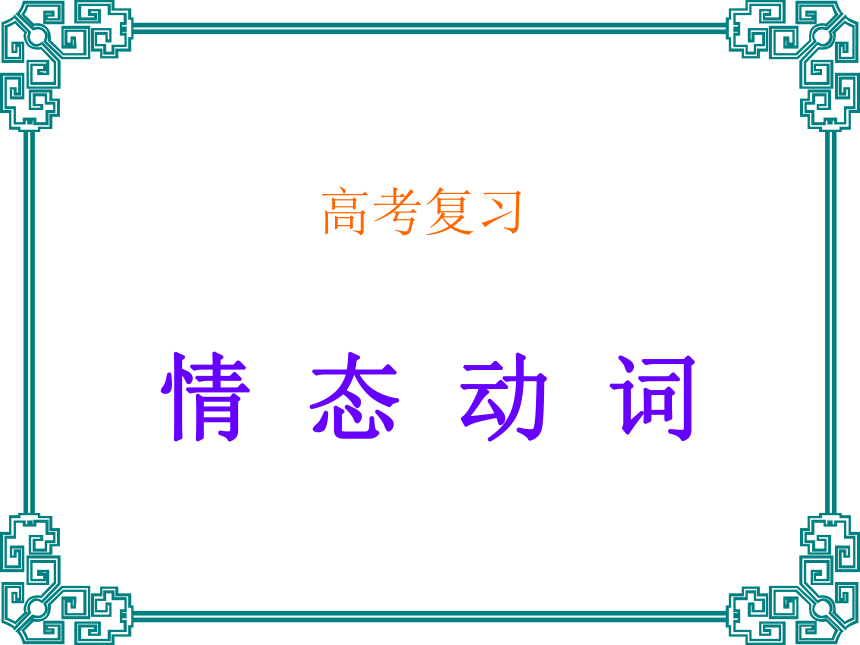
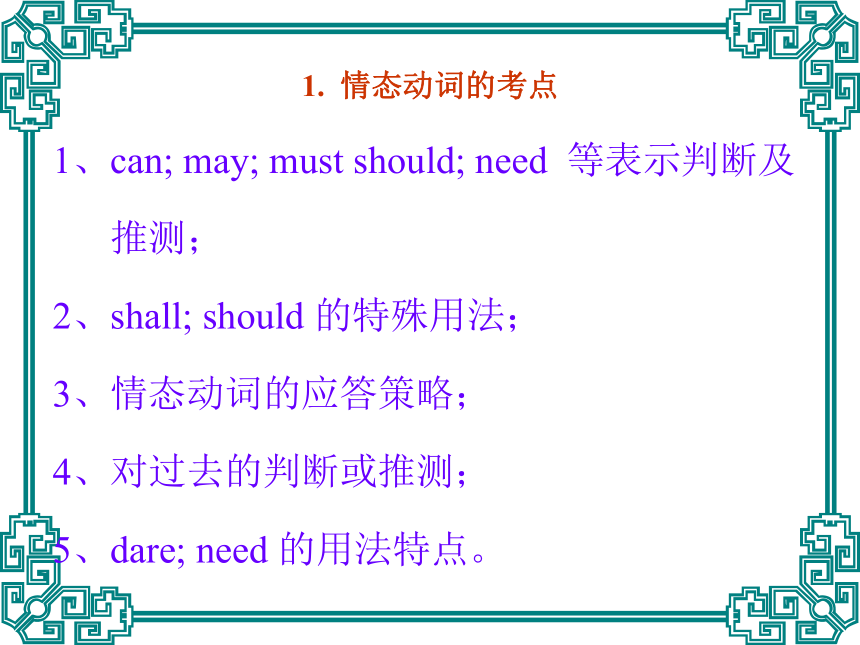
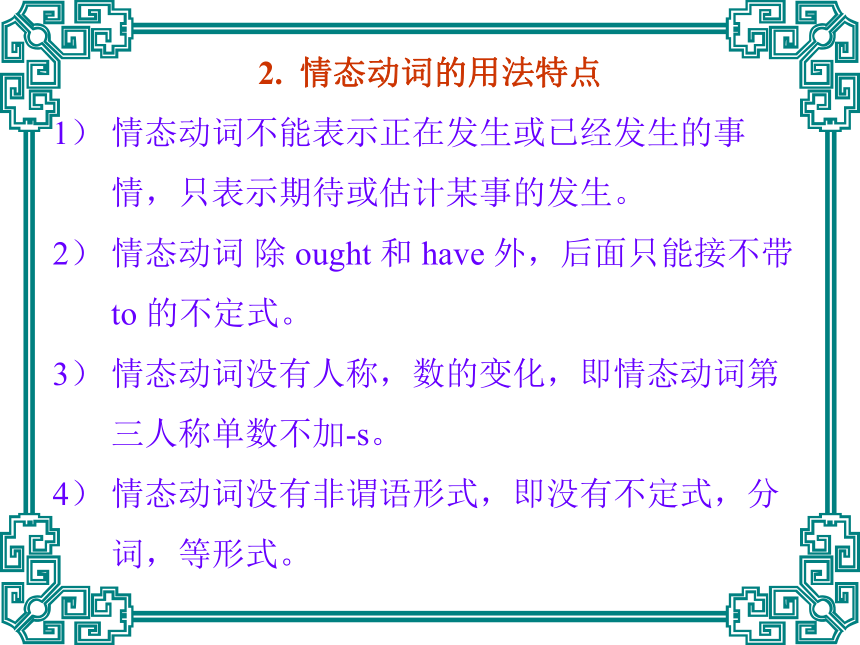
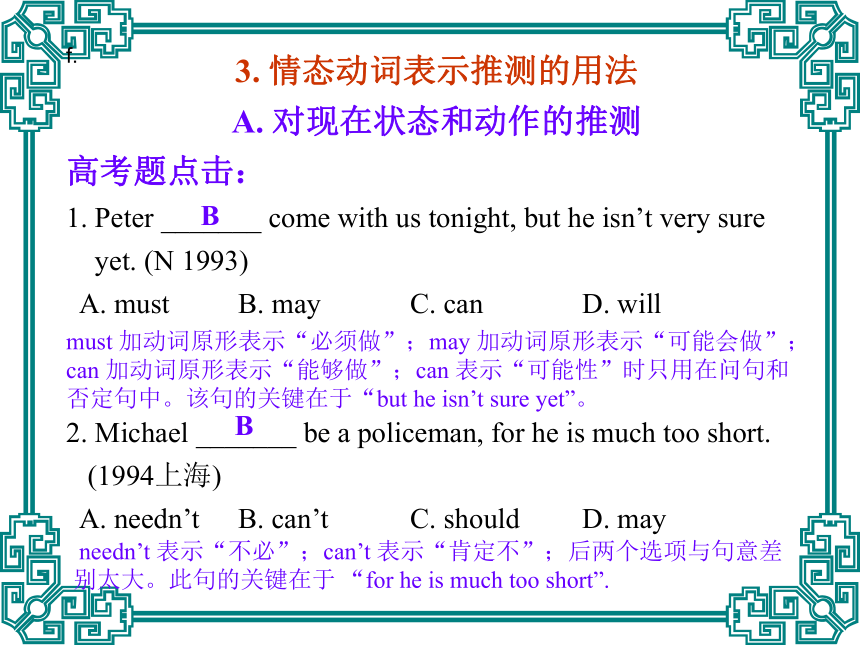

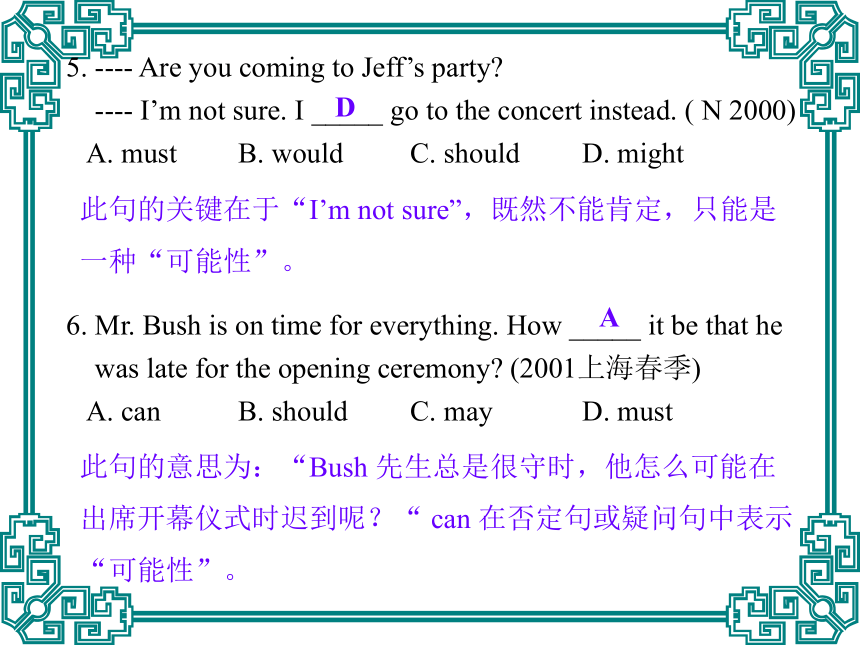
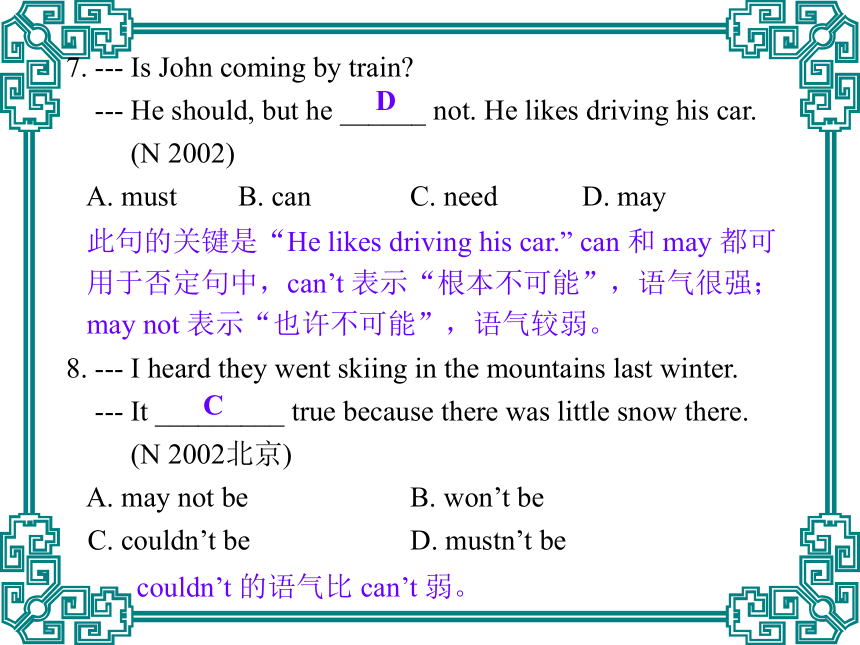
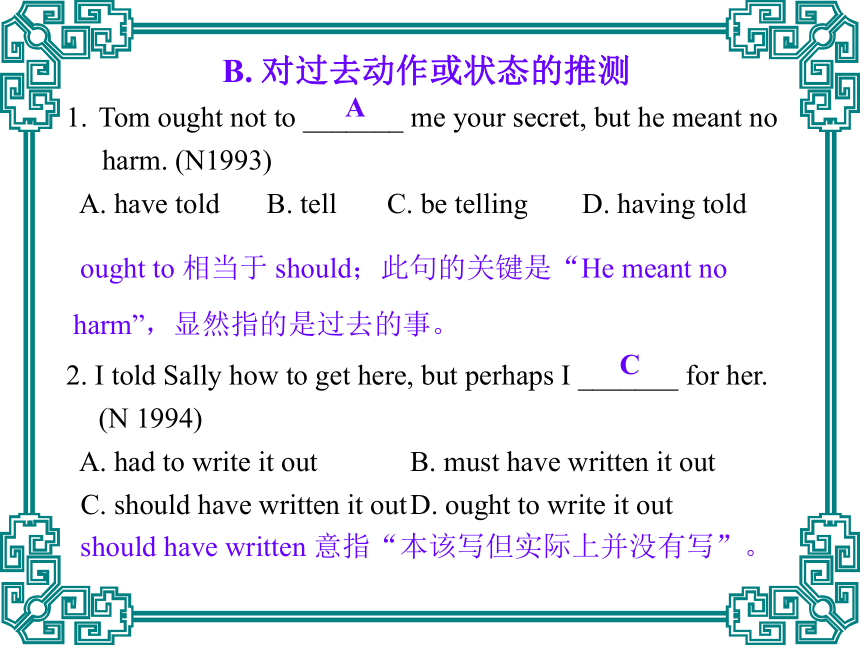
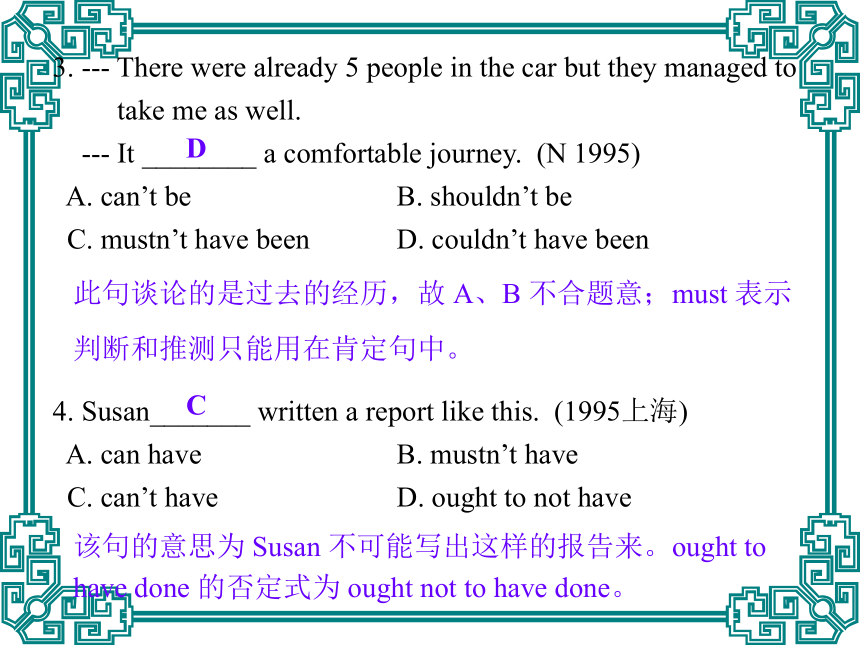
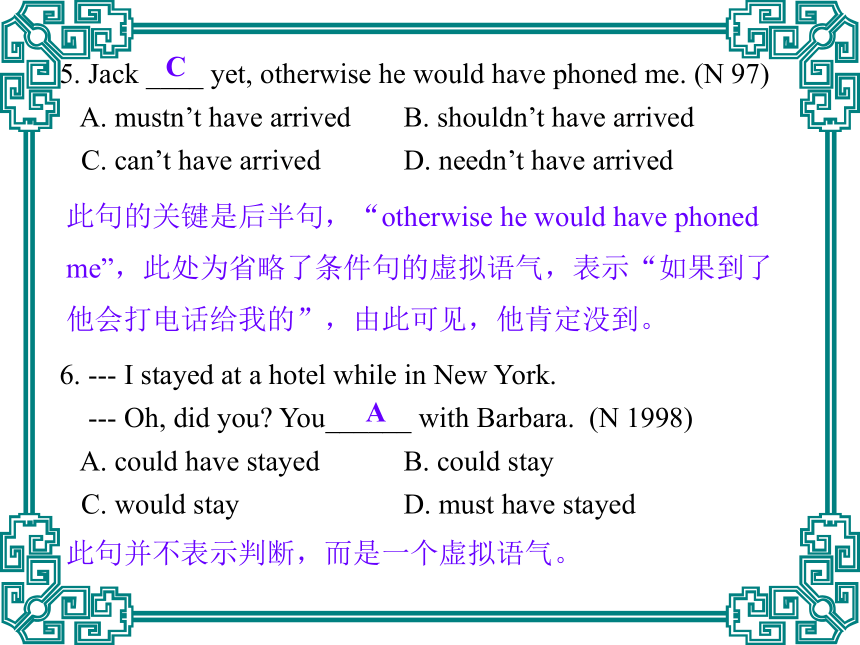
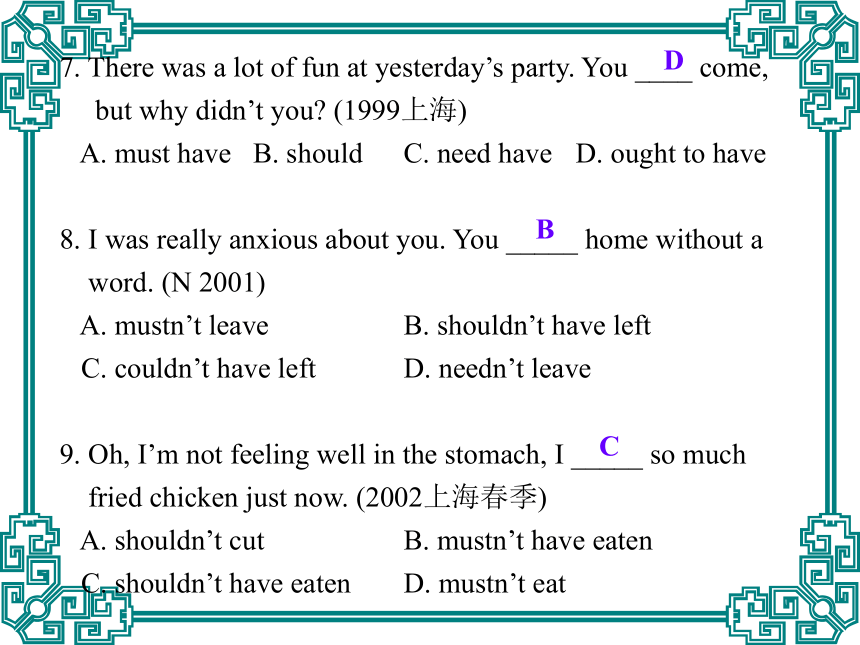

文档简介
课件31张PPT。高考复习情 态 动 词1. 情态动词的考点
1、can; may; must should; need 等表示判断及
推测;
2、shall; should 的特殊用法;
3、情态动词的应答策略;
4、对过去的判断或推测;
5、dare; need 的用法特点。2. 情态动词的用法特点
1) 情态动词不能表示正在发生或已经发生的事
情,只表示期待或估计某事的发生。 2) 情态动词 除 ought 和 have 外,后面只能接不带
to 的不定式。 3) 情态动词没有人称,数的变化,即情态动词第
三人称单数不加-s。 4) 情态动词没有非谓语形式,即没有不定式,分
词,等形式。 f. 3. 情态动词表示推测的用法
A. 对现在状态和动作的推测
高考题点击:
1. Peter _______ come with us tonight, but he isn’t very sure
yet. (N 1993)
A. must B. may C. can D. will
2. Michael _______ be a policeman, for he is much too short.
(1994上海)
A. needn’t B. can’t C. should D. mayBBmust 加动词原形表示“必须做”;may 加动词原形表示“可能会做”;can 加动词原形表示“能够做”;can 表示“可能性”时只用在问句和否定句中。该句的关键在于“but he isn’t sure yet”。 needn’t 表示“不必”;can’t 表示“肯定不”;后两个选项与句意差别太大。此句的关键在于 “for he is much too short”.3. It’s nearly 7:00. Jack ____ be here at any moment. (N 1995)
A. must B. need C. should D. can
4. Johnny, you _______ play with the knife, you _______ hurt
yourself. (N 1996)
A. won’t, can’t B. mustn’t, may
C. shouldn’t, must D. can’t, shouldCB must + be 表示“肯定会”;need + be 表示 “需要在”;should + 动词原形表示“非常有可能”;can 表示可能性只用在否定和疑问句中。前句表示“你不能玩刀”,此处的 “不能”并非表示“能力”,而是表示“允许”,所以只能用“mustn’t”;后句表示“可能会伤着你自己”,故用 may。5. ---- Are you coming to Jeff’s party?
---- I’m not sure. I _____ go to the concert instead. ( N 2000)
A. must B. would C. should D. might
6. Mr. Bush is on time for everything. How _____ it be that he
was late for the opening ceremony? (2001上海春季)
A. can B. should C. may D. mustDA此句的关键在于“I’m not sure”,既然不能肯定,只能是一种“可能性”。此句的意思为:“Bush 先生总是很守时,他怎么可能在出席开幕仪式时迟到呢?“ can 在否定句或疑问句中表示“可能性”。7. --- Is John coming by train?
--- He should, but he ______ not. He likes driving his car.
(N 2002)
A. must B. can C. need D. may
8. --- I heard they went skiing in the mountains last winter.
--- It _________ true because there was little snow there.
(N 2002北京)
A. may not be B. won’t be
C. couldn’t be D. mustn’t beDC此句的关键是“He likes driving his car.” can 和 may 都可用于否定句中,can’t 表示“根本不可能”,语气很强;may not 表示“也许不可能”,语气较弱。 couldn’t 的语气比 can’t 弱。B. 对过去动作或状态的推测
Tom ought not to _______ me your secret, but he meant no
harm. (N1993)
A. have told B. tell C. be telling D. having told
2. I told Sally how to get here, but perhaps I _______ for her. (N 1994)
A. had to write it out B. must have written it out
C. should have written it out D. ought to write it outAC ought to 相当于 should;此句的关键是“He meant no harm”,显然指的是过去的事。 should have written 意指“本该写但实际上并没有写”。3. --- There were already 5 people in the car but they managed to
take me as well.
--- It ________ a comfortable journey. (N 1995)
A. can’t be B. shouldn’t be
C. mustn’t have been D. couldn’t have been
4. Susan_______ written a report like this. (1995上海)
A. can have B. mustn’t have
C. can’t have D. ought to not haveDC此句谈论的是过去的经历,故 A、B 不合题意;must 表示判断和推测只能用在肯定句中。该句的意思为 Susan 不可能写出这样的报告来。ought to have done 的否定式为 ought not to have done。5. Jack ____ yet, otherwise he would have phoned me. (N 97)
A. mustn’t have arrived B. shouldn’t have arrived
C. can’t have arrived D. needn’t have arrived
6. --- I stayed at a hotel while in New York.
--- Oh, did you? You______ with Barbara. (N 1998)
A. could have stayed B. could stay
C. would stay D. must have stayedCA此句的关键是后半句,“otherwise he would have phoned me”,此处为省略了条件句的虚拟语气,表示“如果到了他会打电话给我的”,由此可见,他肯定没到。此句并不表示判断,而是一个虚拟语气。7. There was a lot of fun at yesterday’s party. You ____ come,
but why didn’t you? (1999上海)
A. must have B. should C. need have D. ought to have
8. I was really anxious about you. You _____ home without a
word. (N 2001)
A. mustn’t leave B. shouldn’t have left
C. couldn’t have left D. needn’t leave
9. Oh, I’m not feeling well in the stomach, I _____ so much
fried chicken just now. (2002上海春季)
A. shouldn’t cut B. mustn’t have eaten
C. shouldn’t have eaten D. mustn’t eatDBC4. shall; should 的特殊用法
1. It has been announced that candidates ____ remain in their
seats until all the papers have been collected. (2002上海)
A. can B. will C. may D. shall
2. It’s nearly 7:00. Jack _____ be here at any moment. (N 95)
A. must B. need C. should D. canDC该句的意思为:“通知说所有的考生必须坐在位置上直到考卷收完了才能离开。”考生坐在位置上不能用“能够、将要、可以”来表示。而 shall 在第二、三人称里面表示一种“命令、警告、承诺”等。3. --- When can I come for the photos? I need them tomorrow
afternoon.
--- They __________ be ready by 12:00. (N 1998)
A. can B. should C. might D. need
4. You can’t imagine that a well-behaved gentleman _____ be
so rude to a lady. (2001上海)
A. might B. need C. should D. wouldBC此句应是店主对顾客的承诺。 should 与 how; why 等表示疑问或否定的词连用时,用来表示一种惊奇的心情,意思为“居然、竟然”5. 情态动词的应答
1. --- Shall I tell John about it?
--- No, you ______. I’ve told him already. (N 1994)
A. needn’t B. wouldn’t C. mustn’t D. shouldn’t
2. --- Could I call you by the first name?
--- Yes, you__________. (1998上海)
A. will B. could C. may D. might
AC此句的关键是“I’ve told him already”,由此可见,你就不必再对他说了。在回答 “Could I …”这类婉客气的请求时,只能回答“Yes, you can 或 may”。不能用 could 或 might。3. --- Will you stay for lunch?
--- Sorry, _____. My brother is coming to see me. (N 1999)
A. I mustn’t B. I can’t C. I needn’t D. I won’t
4. ---- Write to me when you get home.
---- __________. (2001北京春季)
A. I must B. I should C. I will D. I canBC此句的关键是 “My brother is coming to see me.” 所以我不能在这儿吃饭。在回答对方的请求或命令时,应该用 “Yes, I will.”而不能使用 would 或 should。6. 情态动词的其它一些用法
1. I wonder how he _______ that to the teacher. (1996上海)
A. dare to say B. dare saying C. not dare say D. dared say
2. The fire spread through the hotel very quickly but everyone
______ get out. (N 1997)
A. had to B. would C. was able to D. could
3. When he was there, he _______ go to that coffee shop at
the corner after work every day. (1996上海)
A. would B. should C. had better D. mightDCA注意比较 dare 和 need 的两种词性的不同用法。注意比较 could 与 was able to 的用法区别。 would 在此处表示过去惯常的动作。情态动词的八大考点一、can/may/must/need 问句的回答方式
疑问句式肯定句式否定答式you may.mustn’t/may not.
you mustneedn’t/don’t have to.
you must.needn’t/don’t have to.
二、can,could,may,might,must 表示判断的用法比较
1. The light is on in the office now, so there _______be someone in it, isn’t there?
2. I’m not sure whether he will come today. He ____________be ill today.
3. Tom has gone to Beijing, so you ______ see him in our school now.mustmay/mightcan’t三、情态动词+不定式完成式是历年高考的热点之一,可表示“推测”、“责备”、“怀疑”等多种意义。
1. must have done
2. may/might have done
3. can’t couldn’t jave done
4. should /ought to have done
5. shouln’t/oughtn’t to have done
6. could have done
7.needn’t have done
8. would rather have done1. The ground is rather wet, so it _______have rained last night, didn’t it?
2. Tom ____have gone to Shanghai, but I’m still not sure about it.
3. The ground is very dry, so it ____have rained last night.
4. Someone must have broken into our bedroom. Who________have done it?
5. I really regretted wasting the hours when I ______have studied hard, but it was too late.mustmaycan’tcouldshould6.Your home is not far from your school, so you _______have left in such a hurry then.
7. I _____________have come to help you with your English, but I was too busy at that time.
8. I’m very sorry for the words I_______ have said to you at that moment.
9. ---I paid a visit to New York last month and we stayed at a nice hotel.
---Oh,you _______have stayed with Barbara.She is always willing to do you a favour.shouldn’t
could
needn’twould rather四、shall和will的比较1. If you ________follow my advice, I _____offer you some help.
2. ______you meet him right now or ____ he wait outside, sir?willshallWillshall五、need和dare作行为动词或情态动词的比较六、can和be able to的比较 ,以及must和have to 的比较
1.Few people ___________ __send their children to school before liberation.
2. Joe was an excellent swimmer, so he _____________swim back to the bank when the ship sank.
3. It snowed heavily last night, so I ________
get up early to sweep the snow in the yard.
4. Every student ______ obey the school rules and become a good student in every way.
could/were able towas able tohad tomust七、used to和 would的比较1、would 主要表示过去一段时间内的某种习惯,常与表示过去的时间状语连用,意为“总要,总是”
used to 主要表示过去存在但是现在已不再存在的习惯,意为“过去常常”。
On Sundays he _______go to call on the old man when he was young.
I _______get up late, but now I have got used to getting up very early.
Xiao Li ________be a model worker. He is now a university student.
wouldused toused to八、情态动词的否定式比较mustn’t禁止,不准
can’t /couldn’t 不能;不可能
needn’t 不必
shouldn’t不该
won’t/ wouldn’t 不愿意
daren’t 不敢 1. The fire spread through the hotel very quickly, but everyone_______get one.
A. were able to B. would
C. was able to D. could
2. You____return the book now, you can keep it until next week if you like,
A. can’t B. mustn’t
C. needn’t D. may not
3. When he was there, he______ go to that coffee shop at the corner after work every day.
A. would B. should C. had better D. might
4. ---Could I use your bike?—Yes, of course.you___.
A. might B. will C. can D. shouldC CAC5. ----Will you stay for lunch?
----Sorry, _______. My brother is coming to see me.
A. I oughtn’t to B. I can’t
C. I needn’t D. I shouldn’t
6. ----______I invite Jcak to the party?
-----Yes, it’ll be nice if you______.
A. Will; may B. Shall; will
C. Shall;shall D. Will; will
7. ---There were already five people in the car, but they managed to take me as well.
---It______a comfortable journey.
A. can’t be B. shouldn’t be
C. mustn’t have been D. couldn’t have beenBBD8. We______last night, but we went to the concert instead.
A. must have studied B. might study
C. should have studied D. would study
9. There was plenty of time. She_____.
A. mustn’t have hurried B. couldn’t have hurried
C. mustn’t hurry D. needn’t have hurried
10. Yesterday, Jane walked away from the discussion. Otherwise. She____something she would regret later.
A. had said B. said
C. might say D. might have said.
CDD11. ----Did you scold him for his mistake?
----Yes, but______it.
A. I’d rather not do
B. I’d better not do
C. I’d better not have done
D. I’d rather have not doneD
1、can; may; must should; need 等表示判断及
推测;
2、shall; should 的特殊用法;
3、情态动词的应答策略;
4、对过去的判断或推测;
5、dare; need 的用法特点。2. 情态动词的用法特点
1) 情态动词不能表示正在发生或已经发生的事
情,只表示期待或估计某事的发生。 2) 情态动词 除 ought 和 have 外,后面只能接不带
to 的不定式。 3) 情态动词没有人称,数的变化,即情态动词第
三人称单数不加-s。 4) 情态动词没有非谓语形式,即没有不定式,分
词,等形式。 f. 3. 情态动词表示推测的用法
A. 对现在状态和动作的推测
高考题点击:
1. Peter _______ come with us tonight, but he isn’t very sure
yet. (N 1993)
A. must B. may C. can D. will
2. Michael _______ be a policeman, for he is much too short.
(1994上海)
A. needn’t B. can’t C. should D. mayBBmust 加动词原形表示“必须做”;may 加动词原形表示“可能会做”;can 加动词原形表示“能够做”;can 表示“可能性”时只用在问句和否定句中。该句的关键在于“but he isn’t sure yet”。 needn’t 表示“不必”;can’t 表示“肯定不”;后两个选项与句意差别太大。此句的关键在于 “for he is much too short”.3. It’s nearly 7:00. Jack ____ be here at any moment. (N 1995)
A. must B. need C. should D. can
4. Johnny, you _______ play with the knife, you _______ hurt
yourself. (N 1996)
A. won’t, can’t B. mustn’t, may
C. shouldn’t, must D. can’t, shouldCB must + be 表示“肯定会”;need + be 表示 “需要在”;should + 动词原形表示“非常有可能”;can 表示可能性只用在否定和疑问句中。前句表示“你不能玩刀”,此处的 “不能”并非表示“能力”,而是表示“允许”,所以只能用“mustn’t”;后句表示“可能会伤着你自己”,故用 may。5. ---- Are you coming to Jeff’s party?
---- I’m not sure. I _____ go to the concert instead. ( N 2000)
A. must B. would C. should D. might
6. Mr. Bush is on time for everything. How _____ it be that he
was late for the opening ceremony? (2001上海春季)
A. can B. should C. may D. mustDA此句的关键在于“I’m not sure”,既然不能肯定,只能是一种“可能性”。此句的意思为:“Bush 先生总是很守时,他怎么可能在出席开幕仪式时迟到呢?“ can 在否定句或疑问句中表示“可能性”。7. --- Is John coming by train?
--- He should, but he ______ not. He likes driving his car.
(N 2002)
A. must B. can C. need D. may
8. --- I heard they went skiing in the mountains last winter.
--- It _________ true because there was little snow there.
(N 2002北京)
A. may not be B. won’t be
C. couldn’t be D. mustn’t beDC此句的关键是“He likes driving his car.” can 和 may 都可用于否定句中,can’t 表示“根本不可能”,语气很强;may not 表示“也许不可能”,语气较弱。 couldn’t 的语气比 can’t 弱。B. 对过去动作或状态的推测
Tom ought not to _______ me your secret, but he meant no
harm. (N1993)
A. have told B. tell C. be telling D. having told
2. I told Sally how to get here, but perhaps I _______ for her. (N 1994)
A. had to write it out B. must have written it out
C. should have written it out D. ought to write it outAC ought to 相当于 should;此句的关键是“He meant no harm”,显然指的是过去的事。 should have written 意指“本该写但实际上并没有写”。3. --- There were already 5 people in the car but they managed to
take me as well.
--- It ________ a comfortable journey. (N 1995)
A. can’t be B. shouldn’t be
C. mustn’t have been D. couldn’t have been
4. Susan_______ written a report like this. (1995上海)
A. can have B. mustn’t have
C. can’t have D. ought to not haveDC此句谈论的是过去的经历,故 A、B 不合题意;must 表示判断和推测只能用在肯定句中。该句的意思为 Susan 不可能写出这样的报告来。ought to have done 的否定式为 ought not to have done。5. Jack ____ yet, otherwise he would have phoned me. (N 97)
A. mustn’t have arrived B. shouldn’t have arrived
C. can’t have arrived D. needn’t have arrived
6. --- I stayed at a hotel while in New York.
--- Oh, did you? You______ with Barbara. (N 1998)
A. could have stayed B. could stay
C. would stay D. must have stayedCA此句的关键是后半句,“otherwise he would have phoned me”,此处为省略了条件句的虚拟语气,表示“如果到了他会打电话给我的”,由此可见,他肯定没到。此句并不表示判断,而是一个虚拟语气。7. There was a lot of fun at yesterday’s party. You ____ come,
but why didn’t you? (1999上海)
A. must have B. should C. need have D. ought to have
8. I was really anxious about you. You _____ home without a
word. (N 2001)
A. mustn’t leave B. shouldn’t have left
C. couldn’t have left D. needn’t leave
9. Oh, I’m not feeling well in the stomach, I _____ so much
fried chicken just now. (2002上海春季)
A. shouldn’t cut B. mustn’t have eaten
C. shouldn’t have eaten D. mustn’t eatDBC4. shall; should 的特殊用法
1. It has been announced that candidates ____ remain in their
seats until all the papers have been collected. (2002上海)
A. can B. will C. may D. shall
2. It’s nearly 7:00. Jack _____ be here at any moment. (N 95)
A. must B. need C. should D. canDC该句的意思为:“通知说所有的考生必须坐在位置上直到考卷收完了才能离开。”考生坐在位置上不能用“能够、将要、可以”来表示。而 shall 在第二、三人称里面表示一种“命令、警告、承诺”等。3. --- When can I come for the photos? I need them tomorrow
afternoon.
--- They __________ be ready by 12:00. (N 1998)
A. can B. should C. might D. need
4. You can’t imagine that a well-behaved gentleman _____ be
so rude to a lady. (2001上海)
A. might B. need C. should D. wouldBC此句应是店主对顾客的承诺。 should 与 how; why 等表示疑问或否定的词连用时,用来表示一种惊奇的心情,意思为“居然、竟然”5. 情态动词的应答
1. --- Shall I tell John about it?
--- No, you ______. I’ve told him already. (N 1994)
A. needn’t B. wouldn’t C. mustn’t D. shouldn’t
2. --- Could I call you by the first name?
--- Yes, you__________. (1998上海)
A. will B. could C. may D. might
AC此句的关键是“I’ve told him already”,由此可见,你就不必再对他说了。在回答 “Could I …”这类婉客气的请求时,只能回答“Yes, you can 或 may”。不能用 could 或 might。3. --- Will you stay for lunch?
--- Sorry, _____. My brother is coming to see me. (N 1999)
A. I mustn’t B. I can’t C. I needn’t D. I won’t
4. ---- Write to me when you get home.
---- __________. (2001北京春季)
A. I must B. I should C. I will D. I canBC此句的关键是 “My brother is coming to see me.” 所以我不能在这儿吃饭。在回答对方的请求或命令时,应该用 “Yes, I will.”而不能使用 would 或 should。6. 情态动词的其它一些用法
1. I wonder how he _______ that to the teacher. (1996上海)
A. dare to say B. dare saying C. not dare say D. dared say
2. The fire spread through the hotel very quickly but everyone
______ get out. (N 1997)
A. had to B. would C. was able to D. could
3. When he was there, he _______ go to that coffee shop at
the corner after work every day. (1996上海)
A. would B. should C. had better D. mightDCA注意比较 dare 和 need 的两种词性的不同用法。注意比较 could 与 was able to 的用法区别。 would 在此处表示过去惯常的动作。情态动词的八大考点一、can/may/must/need 问句的回答方式
疑问句式肯定句式否定答式you may.mustn’t/may not.
you mustneedn’t/don’t have to.
you must.needn’t/don’t have to.
二、can,could,may,might,must 表示判断的用法比较
1. The light is on in the office now, so there _______be someone in it, isn’t there?
2. I’m not sure whether he will come today. He ____________be ill today.
3. Tom has gone to Beijing, so you ______ see him in our school now.mustmay/mightcan’t三、情态动词+不定式完成式是历年高考的热点之一,可表示“推测”、“责备”、“怀疑”等多种意义。
1. must have done
2. may/might have done
3. can’t couldn’t jave done
4. should /ought to have done
5. shouln’t/oughtn’t to have done
6. could have done
7.needn’t have done
8. would rather have done1. The ground is rather wet, so it _______have rained last night, didn’t it?
2. Tom ____have gone to Shanghai, but I’m still not sure about it.
3. The ground is very dry, so it ____have rained last night.
4. Someone must have broken into our bedroom. Who________have done it?
5. I really regretted wasting the hours when I ______have studied hard, but it was too late.mustmaycan’tcouldshould6.Your home is not far from your school, so you _______have left in such a hurry then.
7. I _____________have come to help you with your English, but I was too busy at that time.
8. I’m very sorry for the words I_______ have said to you at that moment.
9. ---I paid a visit to New York last month and we stayed at a nice hotel.
---Oh,you _______have stayed with Barbara.She is always willing to do you a favour.shouldn’t
could
needn’twould rather四、shall和will的比较1. If you ________follow my advice, I _____offer you some help.
2. ______you meet him right now or ____ he wait outside, sir?willshallWillshall五、need和dare作行为动词或情态动词的比较六、can和be able to的比较 ,以及must和have to 的比较
1.Few people ___________ __send their children to school before liberation.
2. Joe was an excellent swimmer, so he _____________swim back to the bank when the ship sank.
3. It snowed heavily last night, so I ________
get up early to sweep the snow in the yard.
4. Every student ______ obey the school rules and become a good student in every way.
could/were able towas able tohad tomust七、used to和 would的比较1、would 主要表示过去一段时间内的某种习惯,常与表示过去的时间状语连用,意为“总要,总是”
used to 主要表示过去存在但是现在已不再存在的习惯,意为“过去常常”。
On Sundays he _______go to call on the old man when he was young.
I _______get up late, but now I have got used to getting up very early.
Xiao Li ________be a model worker. He is now a university student.
wouldused toused to八、情态动词的否定式比较mustn’t禁止,不准
can’t /couldn’t 不能;不可能
needn’t 不必
shouldn’t不该
won’t/ wouldn’t 不愿意
daren’t 不敢 1. The fire spread through the hotel very quickly, but everyone_______get one.
A. were able to B. would
C. was able to D. could
2. You____return the book now, you can keep it until next week if you like,
A. can’t B. mustn’t
C. needn’t D. may not
3. When he was there, he______ go to that coffee shop at the corner after work every day.
A. would B. should C. had better D. might
4. ---Could I use your bike?—Yes, of course.you___.
A. might B. will C. can D. shouldC CAC5. ----Will you stay for lunch?
----Sorry, _______. My brother is coming to see me.
A. I oughtn’t to B. I can’t
C. I needn’t D. I shouldn’t
6. ----______I invite Jcak to the party?
-----Yes, it’ll be nice if you______.
A. Will; may B. Shall; will
C. Shall;shall D. Will; will
7. ---There were already five people in the car, but they managed to take me as well.
---It______a comfortable journey.
A. can’t be B. shouldn’t be
C. mustn’t have been D. couldn’t have beenBBD8. We______last night, but we went to the concert instead.
A. must have studied B. might study
C. should have studied D. would study
9. There was plenty of time. She_____.
A. mustn’t have hurried B. couldn’t have hurried
C. mustn’t hurry D. needn’t have hurried
10. Yesterday, Jane walked away from the discussion. Otherwise. She____something she would regret later.
A. had said B. said
C. might say D. might have said.
CDD11. ----Did you scold him for his mistake?
----Yes, but______it.
A. I’d rather not do
B. I’d better not do
C. I’d better not have done
D. I’d rather have not doneD
